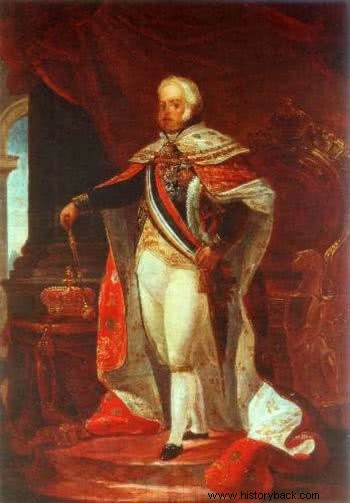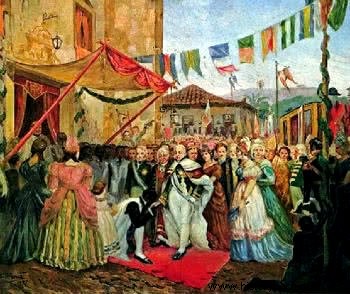Dom João VI , Prince Regent of Portugal, King of the United Kingdom of Portugal, Brazil and the Algarves and, after 1825, King of Portugal.
He was the son of D. Maria I, Queen of Portugal and King Dom Pedro III. Due to his mother's illness he was appointed Prince Regent in 1792. After the death of D. Maria I in 1816 he was acclaimed king in 1818 in Brazil.
During his reign, France invades Portugal, and the Portuguese court moves to Brazil. There, he would create government institutions, face rebellions and wars, until returning to Portugal in 1820.

Portrait of the King Dom João VI, Jean-Baptiste Debret
Birth and Formation
Born on May 13, 1767, Dom João was not destined to be the king of Portugal and its colonies, as his eldest son was Prince Dom José. However, in 1788, his brother dies and he becomes the heir to the throne.
In order to continue the policy of peace between Spain and Portugal, Dom João married in 1785 the Infanta Carlota Joaquina, daughter of the King of Spain, Dom Carlos IV. The marriage was not a happy one, but it produced nine children, eight of whom reached adulthood.
Discover the life of Queen Carlota Joaquina.
Prince Regent
He was named Prince Regent due to the mental health of Queen Maria I. The sovereign had shown signs of mental instability since her husband's death in 1786. Then, a medical board, in 1792, declared her mentally incapable of continuing to reign. . In this way, Dom João assumes the regency of the Kingdom in 1799.
Historical Context
These were times of change for European kingdoms. Enlightenment and liberal ideas spread through Napoleon's books and army. This meant the limitation of royal power through the Constitution that not all monarchs accepted. Likewise, the French army expanded its conquests across the African continent and then across Europe.
Unable to face his greatest enemy, England, on the battlefield, Bonaparte decreed the Continental Blockade in 1806. European countries were prohibited from trading with the United Kingdom and whoever did so would risk being invaded by Napoleonic troops. Portugal refuses to do so due to the historic political alliance existing between the two nations.
Learn more about the Napoleonic Empire.
In 1807, for disobeying Napoleon's orders, the Iberian Peninsula would find itself involved in the wars promoted by the French general. Bonaparte secretly negotiates with the King of Spain, Charles IV, the Treaty of Fontainebleau. In it they agree that Portugal would be divided between French and Spanish, and French troops could pass through Spain, towards Portugal.
The French invasion takes place in November of that year. Dom João needs to make the decision between staying in Portugal and losing the crown or going to some colony of his domains and keeping himself on the throne.
Dom João and his departure for Brazil
After much hesitation, pressured by the English and by the Portuguese court itself, which was divided into pro-French and pro-British, Dom João decided to move the Portuguese court to Rio de Janeiro.
In the vessels he takes documents, paintings, furniture, civil servants and the entire administration of the Kingdom.
Find out all about the coming of the royal family to Brazil.

Dom João and Dona Carlota Joaquina arrive at the Church of Nossa Senhora do Rosário, in Rio de Janeiro.
Dom João in Brazil
Before landing in the capital of Brazil, Dom João landed in Salvador da Bahia, the former capital of the colony. There, he established the first Faculty of Medicine in Brazil and decreed the Opening of Ports to Friendly Nations.
In practice, this treaty puts an end to Brazil's status as a colony, as until now, only Portuguese vessels could trade with Brazil.
Read more about the Johannine Period.
Wars and Rebellions
During the reign of Dom João VI, several wars and rebellions are recorded.
The first of these, in retaliation for the invasion of Portugal, was the occupation of French Guiana by Portuguese troops.
Also at the domestic level, several groups disagree with Dom João VI's centralist policy. The most successful was the Pernambuco Revolution, in 1817, when this province achieved independence for a few months.
See also:Causes of Brazilian IndependenceBack to Portugal
With Napoleon's defeat at the Battle of Waterloo in 1815 and the decisions taken at the Congress of Vienna, the French danger was over. Thus, there was no longer any justification for the permanence of the Portuguese court in Brazil.
However, Dom João VI postponed his return. Only in 1820 when the Liberal Revolt of Porto broke out, the sovereign was forced to return to Lisbon in order to calm the mood and swear to the Constitution that had been written.
However, he leaves his eldest son, Dom Pedro, as Prince Regent of Brazil. Such a measure would end up creating a group that would support the independence of Brazil at the hands of Dom Pedro.
Upon arriving in Portugal, Dom João VI was faced with opposition from his wife, Dona Carlota Joaquina and his son, Prince Dom Miguel, in accepting the new Constitution. Both began to plot the deposition of Dom João VI with successive uprisings such as "Vilafrancada" and "Abrilada". Dom Miguel would be exiled and Dona Carlota Joaquina confined to the Palace of Queluz.
The independence of Brazil would be recognized by Portugal only in 1825 with the help of England, after the payment of a sum of money. The following year, King Dom João VI died, leaving the Portuguese succession open. This indecision would lead to civil war between the brothers Pedro and Miguel.
Recent research shows that Dom João VI was poisoned with arsenic.
Curiosities
- Three sons of Dom João VI and Dona Carlota Joaquina were sovereign:Dom Pedro I, as Emperor of Brazil and as Dom Pedro IV, King of Portugal. Dom Miguel was also King of Portugal from 1828 to 1834 when he was defeated in a civil war by his brother Pedro.
- Dona Maria Izabel of Portugal would be queen consort of Spain.
- Likewise, Dona Izabel Maria was regent of Portugal for almost two years, after the death of D. João VI and the seizure of power by D. Miguel.
Read more :
- Fique Day
- Independence of Brazil
- Flag of Portugal
- Maria Quiteria
